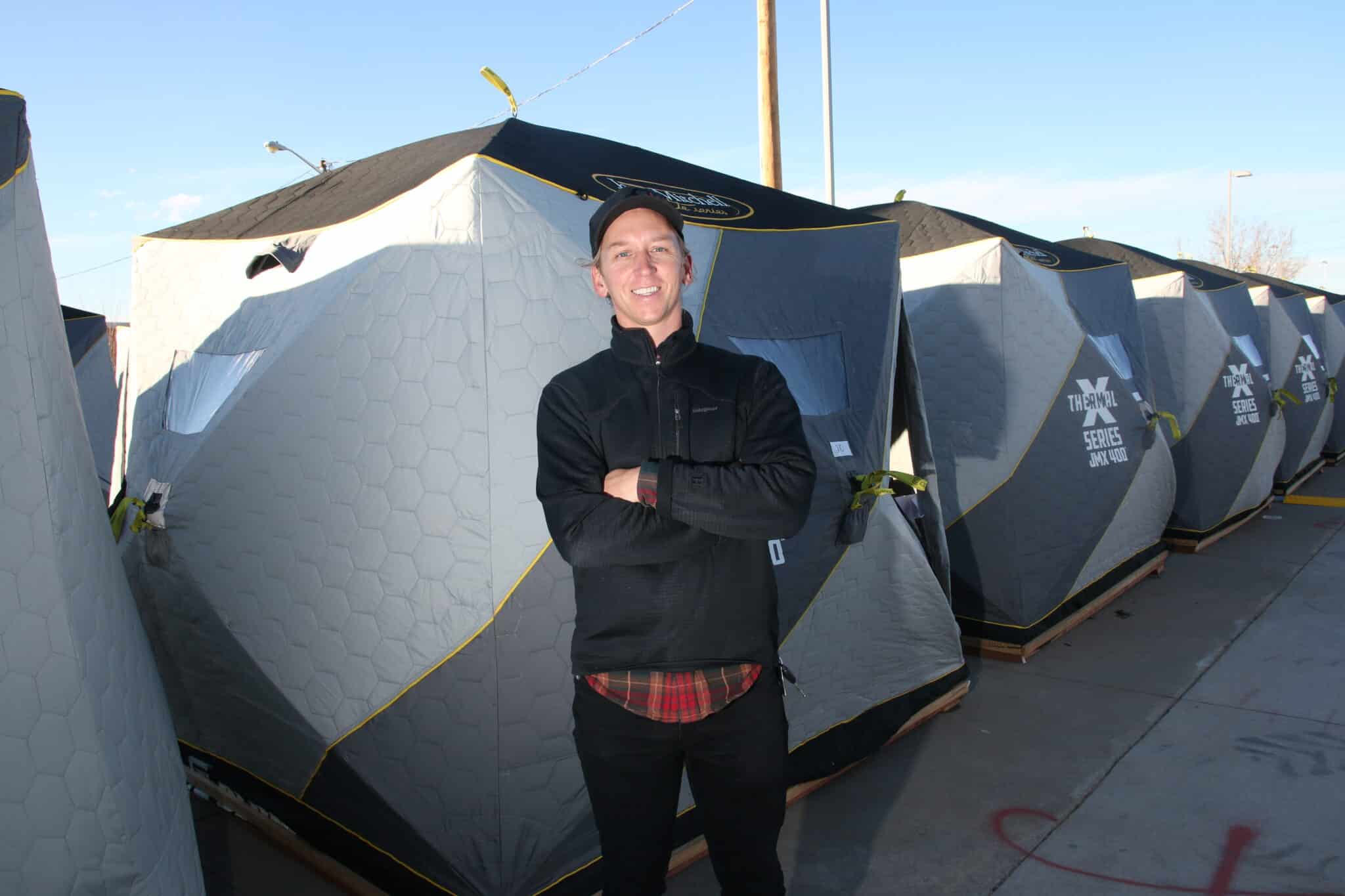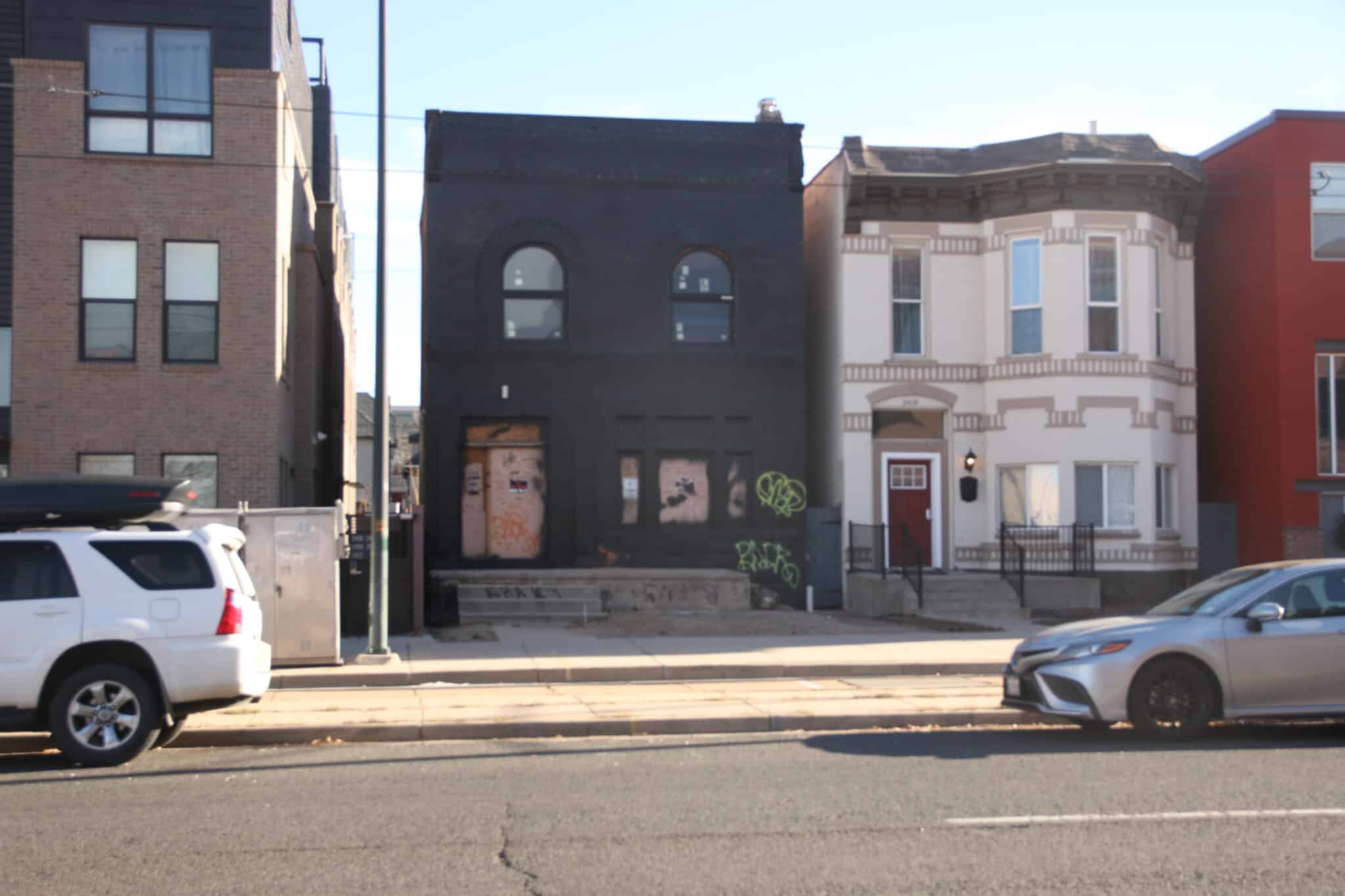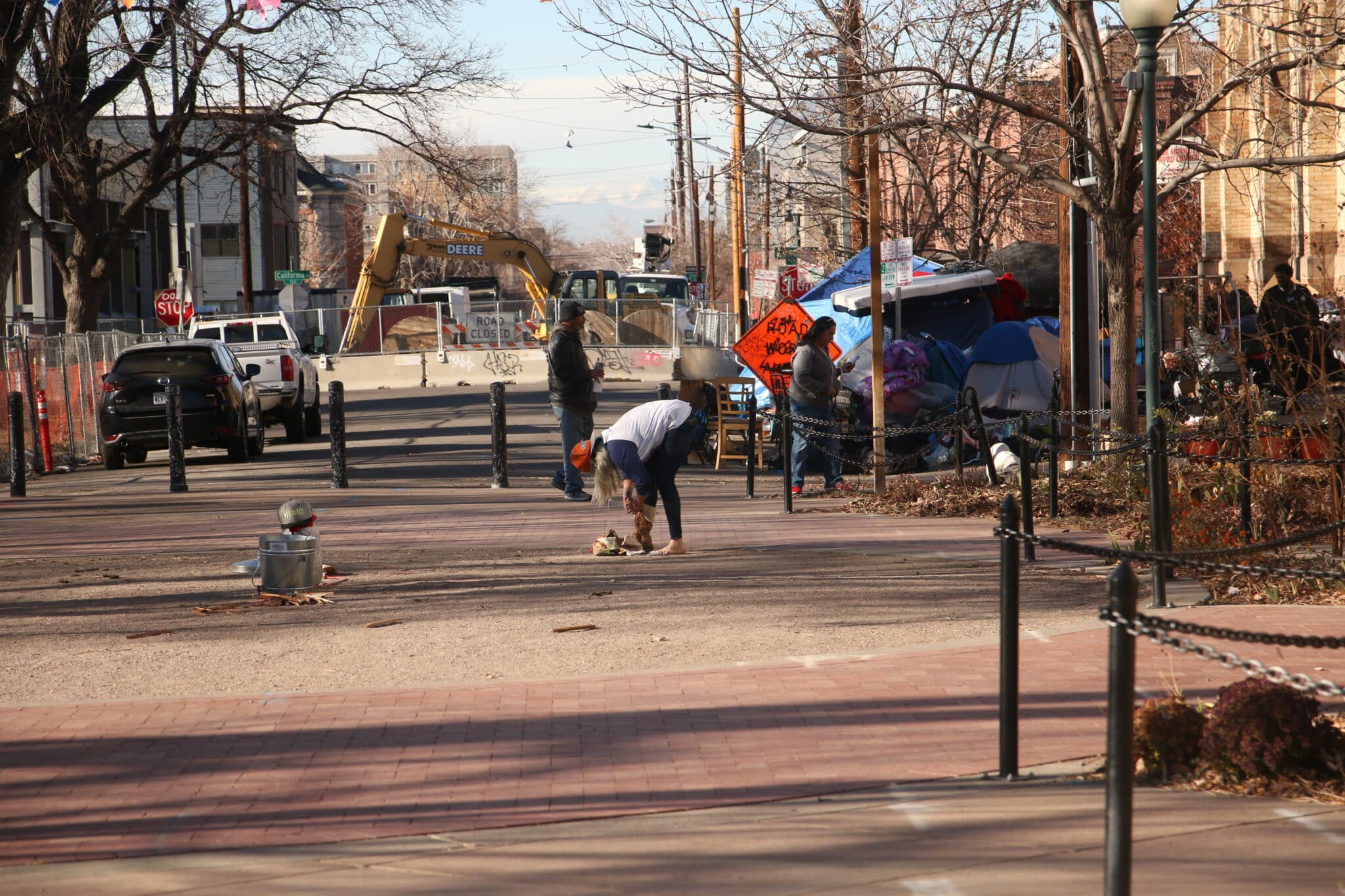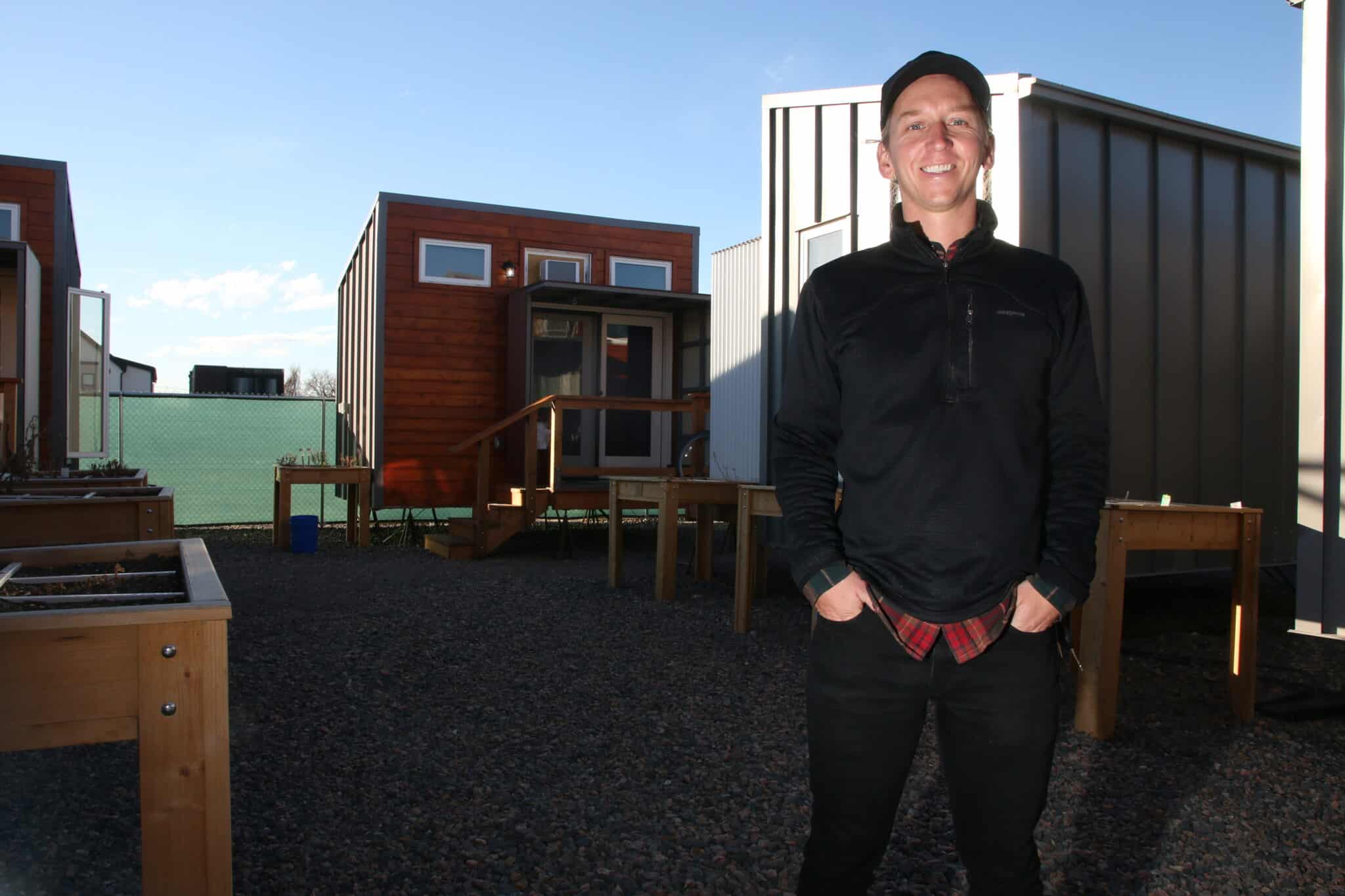
Cole Chandler, founder of Colorado Village Collaborative, in front of the nonprofit’s homeless campsite Dec. 16 at the Denver Human Services east branch in Clayton. (Eric Heinz photos)
When Cole Chandler first moved to Denver in 2014, he lived in a small black home at 24th and Welton in Five Points.
It was owned by Denver Catholic Worker, where Chandler was volunteering, and used to house the otherwise homeless — sometimes up to 15 people, he said. It also used to be colored pink.
Chandler later moved out, but a fire made the house uninhabitable in 2016. Some of those displaced wound up staying at Chandler’s new place.
“A couple of them moved into my wife and my house, lived there with us for the next like three years until I helped fundraise to buy a new Catholic Worker house,” he said in a recent interview.
The experience shows the mindset that has led Chandler to pioneer new approaches to homelessness in Denver, striking deals with private landowners and the city itself to establish tiny home villages and uniform-looking campsites to house those who might otherwise be on the street.
The organization Chandler founded, Colorado Village Collaborative, had a budget of about $2.5 million in 2020, and expects to exceed $5 million in 2022. But Chandler’s campsites have also encountered some opposition as they’ve started to appear in more Denver neighborhoods.
Chandler said since its beginning, CVC has piqued the interest of groups like the Unhoused Action Coalition, which is made up of several neighborhood organizations and business improvement districts, to support the campsites.
“We’ve had people in the business community getting behind the idea … all of them are really becoming advocates,” Chandler said. “The conversation started to change. It wasn’t just a fringe idea anymore. It was something that they had seen, they believed in.”
The beginning: Tiny homes
Chandler, 33, is from Waco, Texas, and received his master’s degree in divinity from Baylor University in 2013. He said he started his first “collaborative house,” a congregate living residence for people who are homeless, in Texas in 2010 before moving to Denver.
“I grew up as a person of faith, and through that process I learned about a commitment to serving poor and marginalized people,” Chandler said. “That was just developed in me. Especially as I was in high school and in college. I just wanted to be useful. I didn’t necessarily identify homelessness as the issue I wanted to work on, but it was a problem that was visible to me.”
Chandler said he thought his time in Denver would be short-term, but he and his wife, Kaylanne, decided to stay.
“We both moved here without jobs, full-time volunteers,” Chandler said, adding his wife became a nurse at Colorado Coalition for the Homeless, an organization that has been around since 1984 and runs the Stout Street Health Center.
It was through Catholic Worker that Chandler said he began to understand Denver’s homeless issues.
“While I was at the Catholic Worker, I just started getting to know people, developing relationships, and some of the people that I lived with (are) founders of Denver Homeless Out Loud,” Chandler said. “They were really starting to talk about tiny home villages, starting to build tiny homes and trying to help build public imagination.”
Denver Homeless Out Loud is another nonprofit that advocates for policy changes to help people without permanent shelter.
Chandler founded CVC in March 2017. With the help of Denver Homeless Out Loud, the nonprofit opened the first tiny home site in Denver in July 2017 in RiNo, later moving it to Globeville.
A second tiny home village opened in December 2020, the Women’s Village at Clara Brown Commons. Both tiny home villages continue to operate.
Benjamin Dunning, director of education at Denver Homeless Out Loud, was one of the people living at the Catholic Worker house when it caught fire. He said being able to live with Chandler and others was great, but he said the city hasn’t done enough to create more housing.
“Cole, to his credit, negotiates all that very diplomatically; his leadership has forged a pathway for some of these things to get started,” Dunning said of tiny homes and campsites. “What exists is a compromise of what could be. The problem is the city is very resistant. The city is against people sharing resources to make living less expensive.”
Chandler started pitching its campsites — which his organization calls “safe outdoor spaces” — to the city in 2020, first at the Denver Coliseum’s parking lot, but he backed away from that location after it didn’t seem like the city would approve it.
Another one was proposed at the Blair-Caldwell African American Research Library, across the street from the old Catholic Worker home.
That idea received pushback from local business organizations and city leaders didn’t like the location either, Chandler said. When BusinessDen visited the library with Chandler on Dec. 16, there was a large unsanctioned homeless encampment to the side of the library, where at least 10 people were hanging out.
“I think that’s an interesting story to be told,” Chandler said. “What is (the site) now? How’s it currently functioning? It could be a safe outdoor space, but it’s not.”
When the COVID-19 pandemic broke out, Hancock reluctantly authorized the city’s zoning administrator, Tina Axelrad, to approve temporary-use zoning for camping.
The sites do not need the City Council’s approval, although they are limited to about 100 people at one time.
CVC managed campsites
CVC has established six campsites since late 2020, and three are operating now.
A 50-tent, 40-person campsite at 780 Elati St. in Lincoln Park opened in mid-November. Another site operates at the Denver Human Services east branch building at 3815 N. Steele St., which was recently approved to use 58 tents to shelter up to 60 people.
CVC started with a budget of $250,000. The nonprofit’s budget ballooned to nearly $2.5 million in 2020 and they expect to have a budget of $5.3 million this year.
Hancock, once hesitant to approve the campsites, slated $4.3 million for tiny homes, campsites and other projects to help homeless people in his 2022 budget. CVC also receives other funding through donations and grants.

The home at 2420 Welton St. used to be a residence used by Denver Catholic Worker to temporarily house homeless people. A fire in 2016 closed it.
Chandler said it may be that CVC needed time to show the mayor around the campsites to convince him they are a good temporary use of not just private but public space.
“I think there was a willingness from the beginning (to allow sanctioned campsites), but maybe we tried a little bit too early because … of public perception,” Chandler said.
Since 2017, tiny homes have sheltered 47 people, with 18 of them finding permanent supportive housing. Since safe outdoor spaces began in late 2020, 242 people have been sheltered with 47 of them finding longer-term housing, according to CVC.
Chandler said CVC is not currently tracking employment data across its campsites, but it is tracking it for tiny home residents. In 2021, 26 of the 47 residents were employed and another 13 received income through Social Security, he said.
Chandler was paid $42,000 in 2019, and he made a little more than $70,000 in 2020, the latest available tax forms show.
Not all neighbors on board
By and large, CVC’s encampments have been given a mixed reception, both from nearby residents and people who don’t live in the neighborhoods.
There are people who support the campsites because they keep homeless people from piling on to medians and near homes, but there are others who say not enough has been done to ensure neighbors are safe.
People opposed to the Park Hill United Methodist Church filed an appeal against the way the site was approved in July, but a city zoning board denied it. That triggered a lawsuit that’s currently going through district court.
There are security guards at the sites 24-7 and people are not allowed to bring guests who have not been admitted into the encampment.
“We occasionally call emergency services at our site,” Chandler said. “But no, there’s been no issues with crime in any of our locations.”
Appeals have been filed against the sites at the Elati Street and Denver Human Services campsites in recent weeks that raise similar concerns to the Park Hill lawsuit. Those appeals will be heard by the Board for Zoning Adjustment in January and February, respectively.
Still, CVC has been able to establish “good neighbor agreements” with at least a few of the neighborhood associations, such as Clayton United and Capitol Hill United Neighbors. An agreement with La Alma-Lincoln Park Neighborhood Association, where the Elati campsite is located, fell through in December.

A homeless camp was visible Dec. 16 by the Blair-Caldwell African American Research Library in Five Points, where Colorado Village Collaborative originally wanted to put a sanctioned campsite.
Someday become a developer
Chandler said the end goal is to get people into permanent housing, whether that’s through supportive services or on their own merits.
Although it could be a long way down the road, he said CVC is interested in ultimately developing permanent housing.
“When it comes time, we’ll lean on our partners, consultants and experts to learn as much as we can about this process and prepare for a large capital campaign and a competitive application,” Chandler said. “We’re a learning organization that is always growing and evolving. Permanent housing is the solution to homelessness, and creating and operating permanent housing will be a natural part of our growth process.”
Additionally, the zoning administrator’s authority to permit tiny homes and safe outdoor spaces at will ends in 2023.
Chandler knows finding space could become difficult. There will be a new mayor sworn in by mid-2023.
“Land is a significant challenge to continuing to scale,” Chandler said. “We don’t just think tiny homes and tents are like the silver bullet to homelessness, but we’re using the tools that we have available to us to address the needs.”
Chandler said CVC will work with the city to try to continue the campsite program even after the administrator’s authority is reeled in.
“If this model remains a key part of the city’s overall strategy, and (Denver’s) five-year strategic plan suggests that it will, that use determination would have to be extended or (campsites) would have to be formally added to the Denver zoning code,” Chandler said.
Chandler said Denver can make significant progress to addressing homelessness through permanent housing.
“The reality is there aren’t enough housing units available for the people that we serve,” Chandler said. “People get stuck in our programs at times because there’s no unit for them to exit to. We’re serving about 200 people at night across our sites right now. And the best way for us to create an exit strategy is for us to develop permanent housing.”

Cole Chandler, founder of Colorado Village Collaborative, in front of the nonprofit’s homeless campsite Dec. 16 at the Denver Human Services east branch in Clayton. (Eric Heinz photos)
When Cole Chandler first moved to Denver in 2014, he lived in a small black home at 24th and Welton in Five Points.
It was owned by Denver Catholic Worker, where Chandler was volunteering, and used to house the otherwise homeless — sometimes up to 15 people, he said. It also used to be colored pink.
Chandler later moved out, but a fire made the house uninhabitable in 2016. Some of those displaced wound up staying at Chandler’s new place.
“A couple of them moved into my wife and my house, lived there with us for the next like three years until I helped fundraise to buy a new Catholic Worker house,” he said in a recent interview.
The experience shows the mindset that has led Chandler to pioneer new approaches to homelessness in Denver, striking deals with private landowners and the city itself to establish tiny home villages and uniform-looking campsites to house those who might otherwise be on the street.
The organization Chandler founded, Colorado Village Collaborative, had a budget of about $2.5 million in 2020, and expects to exceed $5 million in 2022. But Chandler’s campsites have also encountered some opposition as they’ve started to appear in more Denver neighborhoods.
Chandler said since its beginning, CVC has piqued the interest of groups like the Unhoused Action Coalition, which is made up of several neighborhood organizations and business improvement districts, to support the campsites.
“We’ve had people in the business community getting behind the idea … all of them are really becoming advocates,” Chandler said. “The conversation started to change. It wasn’t just a fringe idea anymore. It was something that they had seen, they believed in.”
The beginning: Tiny homes
Chandler, 33, is from Waco, Texas, and received his master’s degree in divinity from Baylor University in 2013. He said he started his first “collaborative house,” a congregate living residence for people who are homeless, in Texas in 2010 before moving to Denver.
“I grew up as a person of faith, and through that process I learned about a commitment to serving poor and marginalized people,” Chandler said. “That was just developed in me. Especially as I was in high school and in college. I just wanted to be useful. I didn’t necessarily identify homelessness as the issue I wanted to work on, but it was a problem that was visible to me.”
Chandler said he thought his time in Denver would be short-term, but he and his wife, Kaylanne, decided to stay.
“We both moved here without jobs, full-time volunteers,” Chandler said, adding his wife became a nurse at Colorado Coalition for the Homeless, an organization that has been around since 1984 and runs the Stout Street Health Center.
It was through Catholic Worker that Chandler said he began to understand Denver’s homeless issues.
“While I was at the Catholic Worker, I just started getting to know people, developing relationships, and some of the people that I lived with (are) founders of Denver Homeless Out Loud,” Chandler said. “They were really starting to talk about tiny home villages, starting to build tiny homes and trying to help build public imagination.”
Denver Homeless Out Loud is another nonprofit that advocates for policy changes to help people without permanent shelter.
Chandler founded CVC in March 2017. With the help of Denver Homeless Out Loud, the nonprofit opened the first tiny home site in Denver in July 2017 in RiNo, later moving it to Globeville.
A second tiny home village opened in December 2020, the Women’s Village at Clara Brown Commons. Both tiny home villages continue to operate.
Benjamin Dunning, director of education at Denver Homeless Out Loud, was one of the people living at the Catholic Worker house when it caught fire. He said being able to live with Chandler and others was great, but he said the city hasn’t done enough to create more housing.
“Cole, to his credit, negotiates all that very diplomatically; his leadership has forged a pathway for some of these things to get started,” Dunning said of tiny homes and campsites. “What exists is a compromise of what could be. The problem is the city is very resistant. The city is against people sharing resources to make living less expensive.”
Chandler started pitching its campsites — which his organization calls “safe outdoor spaces” — to the city in 2020, first at the Denver Coliseum’s parking lot, but he backed away from that location after it didn’t seem like the city would approve it.
Another one was proposed at the Blair-Caldwell African American Research Library, across the street from the old Catholic Worker home.
That idea received pushback from local business organizations and city leaders didn’t like the location either, Chandler said. When BusinessDen visited the library with Chandler on Dec. 16, there was a large unsanctioned homeless encampment to the side of the library, where at least 10 people were hanging out.
“I think that’s an interesting story to be told,” Chandler said. “What is (the site) now? How’s it currently functioning? It could be a safe outdoor space, but it’s not.”
When the COVID-19 pandemic broke out, Hancock reluctantly authorized the city’s zoning administrator, Tina Axelrad, to approve temporary-use zoning for camping.
The sites do not need the City Council’s approval, although they are limited to about 100 people at one time.
CVC managed campsites
CVC has established six campsites since late 2020, and three are operating now.
A 50-tent, 40-person campsite at 780 Elati St. in Lincoln Park opened in mid-November. Another site operates at the Denver Human Services east branch building at 3815 N. Steele St., which was recently approved to use 58 tents to shelter up to 60 people.
CVC started with a budget of $250,000. The nonprofit’s budget ballooned to nearly $2.5 million in 2020 and they expect to have a budget of $5.3 million this year.
Hancock, once hesitant to approve the campsites, slated $4.3 million for tiny homes, campsites and other projects to help homeless people in his 2022 budget. CVC also receives other funding through donations and grants.

The home at 2420 Welton St. used to be a residence used by Denver Catholic Worker to temporarily house homeless people. A fire in 2016 closed it.
Chandler said it may be that CVC needed time to show the mayor around the campsites to convince him they are a good temporary use of not just private but public space.
“I think there was a willingness from the beginning (to allow sanctioned campsites), but maybe we tried a little bit too early because … of public perception,” Chandler said.
Since 2017, tiny homes have sheltered 47 people, with 18 of them finding permanent supportive housing. Since safe outdoor spaces began in late 2020, 242 people have been sheltered with 47 of them finding longer-term housing, according to CVC.
Chandler said CVC is not currently tracking employment data across its campsites, but it is tracking it for tiny home residents. In 2021, 26 of the 47 residents were employed and another 13 received income through Social Security, he said.
Chandler was paid $42,000 in 2019, and he made a little more than $70,000 in 2020, the latest available tax forms show.
Not all neighbors on board
By and large, CVC’s encampments have been given a mixed reception, both from nearby residents and people who don’t live in the neighborhoods.
There are people who support the campsites because they keep homeless people from piling on to medians and near homes, but there are others who say not enough has been done to ensure neighbors are safe.
People opposed to the Park Hill United Methodist Church filed an appeal against the way the site was approved in July, but a city zoning board denied it. That triggered a lawsuit that’s currently going through district court.
There are security guards at the sites 24-7 and people are not allowed to bring guests who have not been admitted into the encampment.
“We occasionally call emergency services at our site,” Chandler said. “But no, there’s been no issues with crime in any of our locations.”
Appeals have been filed against the sites at the Elati Street and Denver Human Services campsites in recent weeks that raise similar concerns to the Park Hill lawsuit. Those appeals will be heard by the Board for Zoning Adjustment in January and February, respectively.
Still, CVC has been able to establish “good neighbor agreements” with at least a few of the neighborhood associations, such as Clayton United and Capitol Hill United Neighbors. An agreement with La Alma-Lincoln Park Neighborhood Association, where the Elati campsite is located, fell through in December.

A homeless camp was visible Dec. 16 by the Blair-Caldwell African American Research Library in Five Points, where Colorado Village Collaborative originally wanted to put a sanctioned campsite.
Someday become a developer
Chandler said the end goal is to get people into permanent housing, whether that’s through supportive services or on their own merits.
Although it could be a long way down the road, he said CVC is interested in ultimately developing permanent housing.
“When it comes time, we’ll lean on our partners, consultants and experts to learn as much as we can about this process and prepare for a large capital campaign and a competitive application,” Chandler said. “We’re a learning organization that is always growing and evolving. Permanent housing is the solution to homelessness, and creating and operating permanent housing will be a natural part of our growth process.”
Additionally, the zoning administrator’s authority to permit tiny homes and safe outdoor spaces at will ends in 2023.
Chandler knows finding space could become difficult. There will be a new mayor sworn in by mid-2023.
“Land is a significant challenge to continuing to scale,” Chandler said. “We don’t just think tiny homes and tents are like the silver bullet to homelessness, but we’re using the tools that we have available to us to address the needs.”
Chandler said CVC will work with the city to try to continue the campsite program even after the administrator’s authority is reeled in.
“If this model remains a key part of the city’s overall strategy, and (Denver’s) five-year strategic plan suggests that it will, that use determination would have to be extended or (campsites) would have to be formally added to the Denver zoning code,” Chandler said.
Chandler said Denver can make significant progress to addressing homelessness through permanent housing.
“The reality is there aren’t enough housing units available for the people that we serve,” Chandler said. “People get stuck in our programs at times because there’s no unit for them to exit to. We’re serving about 200 people at night across our sites right now. And the best way for us to create an exit strategy is for us to develop permanent housing.”

